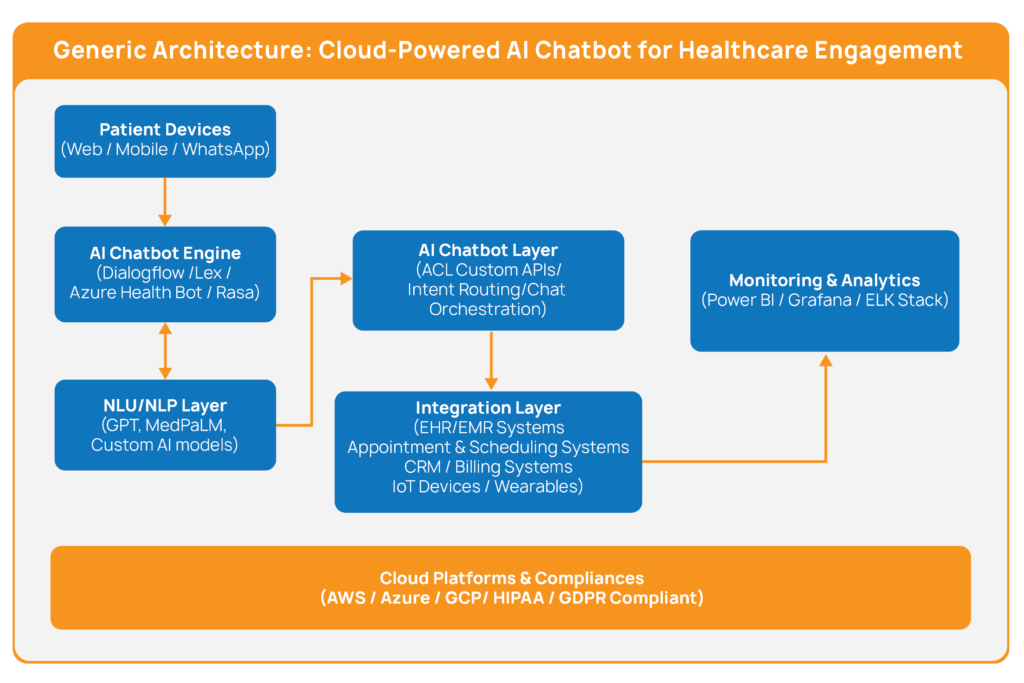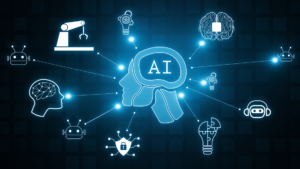


Ezhilvendan Selvam
5 Minutes read
Transforming Patient Engagement with Cloud-Based AI Chatbots: A Scalable Healthcare Strategy
The healthcare industry is undergoing a rapid transformation with the integration of Artificial Intelligence (AI) and cloud-driven chatbot solutions. AI-powered virtual assistants are redefining patient engagement by automating interactions, offering real-time assistance, and optimizing healthcare workflows.
With advancements in Natural Language Processing (NLP) and cloud-based AI frameworks, healthcare providers can now implement intelligent chatbots for enhanced patient communication, triage processes, chronic disease management, and administrative support. In this blog, we will explore:
- The evolving role of AI chatbots in modern healthcare
- Three high-impact use cases improving patient experience
- Market-ready AI chatbot solutions available for rapid deployment
AI-Powered Virtual Assistants in Healthcare: A Game Changer
The shift towards digital healthcare demands seamless communication between patients and providers. Cloud-hosted AI chatbots enable healthcare organizations to:
- Reduce patient wait times with instant responses
- Streamline appointment scheduling and reminders
- Improve chronic care management through automated tracking
- Enable 24/7 virtual support via multiple channels (web, mobile, & messaging)
- Optimize hospital workflows by reducing the burden on call centers
With cloud platforms like AWS, Microsoft Azure, and Google Cloud, deploying AI chatbots is easier than ever, allowing scalability, security, and compliance with healthcare regulations like HIPAA. Let’s take a deeper look at impactful use cases of AI chatbots in healthcare.
Future Trends: The Evolving Role of AI in Healthcare Chatbots
As healthcare becomes increasingly digital, AI-powered chatbots are evolving from basic Q&A interactions into intelligent, proactive virtual health assistants. Here are some emerging trends shaping the future of healthcare chatbots:
- Generative AI for Medical Queries: Advanced generative models such as GPT and Med-PaLM are now being integrated to provide context-aware, nuanced responses to patient queries. These chatbots can summarize complex clinical information, offer personalized care suggestions, and assist healthcare professionals in decision-making.
- Personalized Health Coaching: AI-driven chatbots are now offering real-time, personalized wellness coaching by analyzing user data such as sleep patterns, diet, physical activity, and vitals. This is transforming patient care into a more holistic and preventive model.
- Predictive Analytics for Preventive Care: By integrating with electronic health records (EHRs) and wearable devices, chatbots can identify potential health risks early and recommend timely interventions. This capability is crucial for chronic conditions and supporting early diagnosis.
- Emotion Recognition & Mental Health Support: Modern chatbots are being trained to recognize tone, sentiment, and language patterns to detect stress, anxiety, or depression. Emotion-aware AI can recommend mental health resources or escalate to human counselors.
- Multilingual & Culturally Adaptive Support: As global healthcare systems embrace telemedicine, AI chatbots with multilingual capabilities enable access across regions and languages, breaking barriers to care across diverse populations.
Challenges in Integrating AI Chatbots into Healthcare Systems
While AI chatbots present tremendous potential for enhancing patient engagement and streamlining care delivery, integrating them into real-world healthcare environments comes with significant challenges:
- Data Privacy and Compliance: Patient data is among the most sensitive information in any system. AI chatbots that handle this data must strictly follow regulations such as HIPAA and GDPR. Ensuring secure data handling through robust encryption, anonymization, and access controls is critical to maintaining patient trust and avoiding legal risks. For instance, a chatbot designed to help patients manage diabetes must ensure that personal health data is securely stored and only accessible to authorized healthcare professionals.
- System Interoperability: Most hospitals and clinics use legacy systems like Electronic Health Records (EHRs) and Hospital Information Systems (HIS), which often lack seamless communication and compatibility with modern AI platforms. Integrating AI chatbots into these systems involves building secure APIs or data bridges between the chatbot and hospital databases. From an operational perspective, this impacts how smoothly the chatbot can pull up patient information or update appointment records. For example, when a patient schedules an appointment through a chatbot, the booking should be reflected instantly in the hospital’s system to avoid duplication or manual errors.
- Trust and Adoption: Even the most advanced chatbot will fail if patients or healthcare professionals don’t trust it. Many users remain cautious about relying solely on AI for medical guidance without human oversight. To build confidence, chatbots must be transparent and explain how they arrive at their conclusions. Non-technical users, like patients or frontline staff, need intuitive interactions, a human-like tone, and fallback options to connect with a real healthcare provider when needed. For example, a symptom-checker chatbot should clearly explain why it suggests a particular condition and offer the option to consult a physician.
Benefits of AI Chatbots and Virtual Assistants in Healthcare
AI chatbots and virtual assistants are revolutionizing how healthcare providers engage with patients, not just by automating tasks, but by enabling meaningful, real-time interaction across the care continuum. Here’s how they create value:
- 24/7 Patient Interaction: AI chatbots provide continuous round-the-clock support, enabling patients to ask questions, book appointments, or receive medication reminders without relying on human staff. For healthcare providers, this ensures consistent engagement and care accessibility, even outside standard hospital hours.
Example: A patient experiencing mild symptoms at midnight can chat with a bot, receive preliminary advice, and instantly schedule a next-day consultation. - Reduced Hospital Workload: AI chatbots efficiently manage high-volume tasks such as answering FAQs, triaging non-critical cases, and handling appointment workflows. This reduces pressure on administrative and nursing staff. Seamless integration with hospital systems like Electronic Health Records (EHRs) and Customer Relationship Management (CRM) platforms ensures smooth automated responses and real-time data synchronization.
Example: A chatbot addresses common pre-surgery queries, reducing the number of calls received by hospital staff and enabling faster patient support. - Improved Patient Adherence: AI assistants can send personalized reminders for medications, follow-up visits, and lifestyle actions—helping patients stick to treatment plans. This consistent digital touchpoint improves health outcomes while easing the burden on care coordinators.
Example: A patient recovering from surgery receives daily prompts to track pain levels and take prescribed medications, improving adherence to the post-operative care plan. - Post-Surgical & Elderly Care Support: Elderly patients and those recovering from surgery often require continuous monitoring, reminders, and emotional support. AI chatbots can:
- Send medication and rehabilitation reminders
- Track symptoms, vitals, and pain levels
- Send alerts to caregivers in case of abnormal readings
- Provide conversational check-ins to reduce feelings of isolation
- Example: A post-surgical patient receives daily reminders to track pain levels, while caregivers get instant alerts if conditions worsen.
- Telemedicine Integration & Synergy: AI chatbots play an essential role in enhancing telemedicine workflows by acting as a bridge between patients and healthcare providers:
- Pre-consultation: Chatbots collect patient symptoms, fill out pre-visit forms, and sync with the EHR—saving physicians valuable time.
- Post-consultation: Chatbots deliver personalized follow-ups, clarify care instructions, and answer common questions about medication or care routines.
- Example: After a virtual consultation, a chatbot reminds the patient to fill their prescription and automatically schedules the next check-up.
Security & Compliance in AI Chatbots
In healthcare, security and compliance are not optional—they are foundational. Any healthcare chatbot must be designed to protect sensitive patient data and meet regulatory expectations. Key security and compliance considerations include:
- Data Encryption: All communication must be encrypted both in transit and at rest to prevent unauthorized access during storage or exchange.
- Audit Trails: Every data interaction must be logged to create a verifiable history, which is essential for audits, investigations, and accountability.
- Role-Based Access Controls (RBAC): Access to sensitive data must be strictly limited based on user roles (doctor, admin, patient), ensuring that only authorized personnel can view or modify patient records.
Generic Architecture: Cloud-Powered AI Chatbot for Healthcare Engagement

This diagram presents a generic, scalable architecture for deploying AI chatbots in the healthcare sector. It highlights how patient interactions are managed through intelligent systems to deliver timely, secure, and personalized support — whether for symptom checking, appointment scheduling, post-surgical care, or insurance inquiries.
Key Components:
- Patient Devices: Patients interact with the chatbot through web applications, mobile apps, or messaging platforms such as WhatsApp. This two-way communication enables them to ask questions, book appointments, receive medication reminders, and access healthcare services anytime, anywhere.
- AI Chatbot Engine: At the core is the AI chatbot engine, built using platforms like Dialogflow, Amazon Lex, Azure Health Bot, or Rasa. It manages the conversational flow and basic responses, serving as the primary interface between the user and backend intelligence.
- NLU/NLP Layer: This layer empowers the chatbot’s ability to understand human language. Tools like GPT, MedPaLM, or custom NLP models help extract user intent, understand symptoms, and generate meaningful, contextual responses. This is where the system “understands” the patient.
- AI Chatbot Layer: Once user intent is captured, this layer, often built using ACL’s custom APIs, handles core logic, including conversation routing, triggering backend workflows, session management, and personalizing interactions. It acts as the orchestrator of the entire chatbot ecosystem.
- Integration Layer: This layer connects the chatbot to essential healthcare systems, enabling real-time access to critical data and seamless execution of tasks. It integrates with:
- EHR/EMR systems (for accessing patient records)
- Appointment and scheduling tools
- CRM and billing platforms
- IoT or wearable devices (for vitals and monitoring)
It ensures that the chatbot can access real-time data and perform useful actions such as confirming an appointment or alerting healthcare staff.
Cloud Platform and Security Compliance
The entire AI chatbot solution operates securely on leading cloud platforms such as AWS, Azure, or Google Cloud (GCP). These platforms offer:
- High scalability to handle fluctuating workloads
- Built-in redundancy for continuous availability
- HIPAA and GDPR compliance to meet stringent healthcare data security regulations
They also enable secure API management, storage, and real-time compute power for chatbot tasks.
Monitoring and Performance Analytics
This layer collects logs, performance metrics, and user engagement insights using tools like Power BI, Grafana, or ELK Stack. This helps in improving the bot, identifying failures, and making data-driven decisions about care delivery.
Now that we have outlined the architecture, cloud infrastructure, and monitoring approach, let’s explore some real-world use cases where AI-powered chatbots are transforming healthcare engagement.
Use Case 1: AI-Powered Virtual Assistants for 24/7 Patient Support
The Challenge
Patients often face delays in receiving timely responses from hospitals due to overloaded call centers and limited staff availability. Routine tasks such as scheduling appointments or accessing medical information typically require human intervention, leading to longer wait times.
The Solution
AI-powered virtual assistants offer 24/7 automated support, enabling patients to:
- Book appointments and receive timely reminders
- Get instant answers to frequently asked medical queries
- Check doctor availability and manage follow-up reminders
- Access personalized health advice based on their medical history
Benefits
- Reduces hospital call center workload
- Enhances patient engagement & satisfaction
- Provides real-time responses without the need for human intervention
- Seamlessly integrates with hospital EHR/EMR systems for automated data access and updates
Market-Ready AI Solutions
- IBM Watson Assistant: AI-powered healthcare chatbot with seamless integration capabilities
- Google Dialogflow: NLP-based chatbot for patient interactions
- Amazon Lex: AI-driven voice and text assistant designed for healthcare applications
- Azure Health Bot: HIPAA-compliant chatbot for medical institutions
- Gupshup Health Bot: Conversational AI platform for automated patient support and engagement
Use Case 2: AI-Driven Symptom Checking & Automated Triage
The Challenge
Emergency rooms often face overcrowding due to an influx of non-critical cases, leading to delays in urgent patient care. Additionally, patients frequently lack reliable self-assessment tools, making it difficult to determine whether immediate medical attention is necessary.
The Solution
AI-driven symptom checkers empower patients by analyzing their symptoms and offering timely recommendations. Here’s how they work:
- Patients input symptoms into the chatbot
- The chatbot leverages AI algorithms and medical databases to assess the severity of the condition
- It provides self-care advice for minor issues or escalates the case to a healthcare professional when necessary
- It connects patients with appropriate telehealth services or hospital facilities if required
Benefits
- Reduces unnecessary ER visits
- Ensures timely triage & prioritization of critical cases
- Enhances efficiency within hospital emergency departments
- Improve accessibility for remote patients
Market-Ready AI Solutions
- Infermedica: AI-based symptom checker and triage system
- Ada Health: Conversational AI symptom checker for early diagnosis
- Buoy Health: AI-driven triage chatbot for patient decision-making
- Sensely: AI-powered virtual nurse for patient symptom assessment
- Babylon Health AI: AI-based doctor consultation and symptom-checking platform
Use Case 3: Conversational AI for Chronic Disease Management
The Challenge
Patients with chronic diseases such as diabetes, hypertension, and asthma require continuous monitoring, strict medication adherence, and lifestyle adjustments. However, regular doctor visits and manual tracking can be challenging and time-consuming.
The Solution
AI-powered chronic disease management assistants help bridge the gaps by providing:
- Daily reminders for medication, diet, and exercise
- Automated symptoms tracking and health progress monitoring
- Wearable device integration for real-time health monitoring
- Alerts for doctors and caregivers in case of irregularities
- Personalized health insights & recommendations
Benefits
- Improves medication adherence
- Reduces hospital readmissions through early detection and intervention
- Enhance patient-doctor communication via continuous health tracking and reporting
- Empowers patients to take greater control of their chronic conditions and daily health routines
Market-Ready AI Solutions
- Livongo AI: AI-driven platform for managing diabetes and hypertension
- Hale Health AI: Conversational AI designed for personalized chronic care
- Wellness Coach AI: AI-powered health coaching for chronic disease prevention
- Healthily (Your.MD): AI-based personalized chronic care guidance
- Dreem AI Health Assistant: Chronic disease AI companion for remote monitoring
Use Case 4: AI-Powered Insurance & Billing Assistance
The Challenge
Medical billing and insurance claims are often complex and time-consuming, causing frustration for patients.
The Solution
AI-powered chatbots streamline healthcare billing & insurance processes by:
- Providing real-time insurance coverage information
- Automating claims processing & tracking
- Instantly answering common billing-related inquiries
Benefits
- Reduces insurance claim processing time
- Minimizes billing errors through automation
- Enhances patient satisfaction with faster and transparent process
- Improves hospital revenue cycle management
- Reduces the workload on call centers and administrative teams
- Ensures 24/7 support for billing and insurance queries
Market-Ready AI Solutions
- Kore.ai Healthcare AI: AI-driven medical billing assistant
- NLP Logix: AI chatbot for insurance claims processing
- Rasa Open-Source AI: Custom AI assistant for medical billing
Explore More: Real-World Case Studies
Interested in how these innovations look in action? Here are two real-world implementations by ACL Digital that demonstrate the impact of AI-driven healthcare solutions:
- Developed an AI Platform for Patient Diagnosis & Enhanced Care Delivery
Learn how ACL Digital helped create an AI-powered diagnostic platform that enhances clinical decision-making and streamlines patient engagement. - Developed an Advanced Remote Patient Health Monitoring Solution
See how ACL Digital enabled continuous patient monitoring and proactive care delivery through a cloud-integrated remote health management system.
Key Takeaways
- AI chatbots significantly improve patient access, reduce hospital workload, and boost treatment adherence.
- Seamless integration with EHR systems, CRM platforms, and wearable devices is critical for maximizing chatbot effectiveness.
- Data security, transparency, and explainability are essential for building trust and driving adoption.
- Cloud platforms enable healthcare providers to scale, comply with regulations, and deploy AI chatbots quickly.
- ACL Digital delivers full-stack, end-to-end solutions customized to meet the evolving needs of healthcare organizations.
Conclusion
AI-powered chatbots and virtual assistants are revolutionizing patient engagement by delivering real-time support, automating triage processes, and assisting with chronic disease management. Healthcare providers can now leverage market-ready AI solutions to integrate these technologies rapidly—without the need for extensive, costly development cycles.
About ACL Digital
At ACL Digital, we specialize in designing and developing smart, connected healthcare solutions tailored to meet the evolving needs of the industry. With deep expertise in AI/ML engineering, cloud technologies, and healthcare compliance, we empower healthcare providers to build intelligent systems that enhance patient care, streamline operations, and ensure regulatory adherence. Our vast experience across the healthcare domain enables us to deliver scalable, and customized solutions, including AI-driven chatbots, remote patient monitoring platforms, and integrated digital health applications, all developed with a strong focus on HIPAA compliance and security best practices.
We are committed to helping healthcare organizations stay ahead in a rapidly transforming digital landscape. Our vision is to drive the next wave of innovation by combining conversational AI, cloud scalability, and healthcare regulatory expertise to create advanced virtual care solutions. We are continuously evolving our service capabilities to incorporate emerging technologies such as emotion recognition, predictive triage, and multilingual support, empowering healthcare providers to deliver more inclusive, personalized, and proactive patient engagement at scale.
Connect with our experts to learn more about our healthcare experience and how we are transforming patient engagement through innovative solutions.
Related Insights



On-Device AI & Edge Computing in Mobile Apps for the Healthcare Industry

Vibe Coding & AI‑Driven Development: Work with AI, Not Alone


